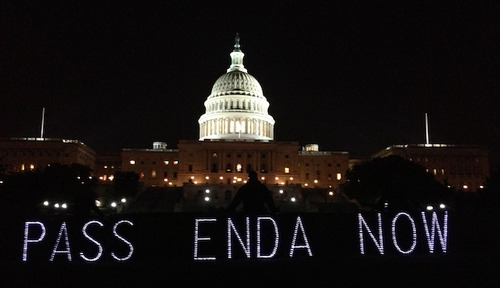 Photo of the Capitol building at night, with the words 'PASS ENDA NOW' in lights
Photo of the Capitol building at night, with the words 'PASS ENDA NOW' in lights
Valuing Trans* Lives and Labor
Maryland Light Brigade calls for passage of the Employment Non-Discrimination Act in Washington, D.C. – Photo via GetEQUAL
By Queen Arsem-O'Malley
In 1990, a group of disability rights activists gathered outside the Capitol building in Washington, D.C. and crawled up the 100 front steps, calling for the passage of the Americans with Disabilities Act. The direct action, known as the “Capitol Crawl”, is often credited with prompting Congress to vote the bill through, solidifying protections for workers with disabilities.
Workers in the United States are protected from discrimination on the basis of race, age, and sex. In 1938, a federal minimum wage was established. In 1963, women were promised equal pay (although of course there is still some work to do in that area). In 2008, protection was extended to prohibit genetic information from being used as a basis of discrimination in employment or health benefits.
Yet trans* workers are discriminated against in the hiring process and in the coverage that their benefits provide, and suffer harassment in the workplace with no way to hold employers and coworkers accountable. Only 17 states and Washington, D.C. – that’s about one-third of the country – have laws explicitly banning discrimination against workers based on gender identity or expression. So, how far is the US from federal protection – and how badly do we need it?
White trans* people in the US are twice as likely to be unemployed as gender-conforming workers. Trans* people of color are four times as likely to be unemployed. In a survey of over 6,400 trans*-identified people, 90% said that they had experienced harassment or discrimination at work. (Statistics of discrimination against trans* folks broken down by gender are not readily available.)
A September 2013 report on the treatment of trans* workers in the workplace – the first of its kind – found that 45% of respondents were referred to by the wrong gender pronoun, repeatedly and purposefully; 22% were denied access to the appropriate bathroom. One in 14 faced physical violence due to their trans* or gender nonconforming status.
The federal government has made small, slow steps toward recognizing that trans* folks have rights that need protecting. The US State Department finally eliminated surgical requirements for updating passports in 2010; this summer, the Social Security Administration did the same. In 2011, the Department of Labor issued policies that classified gender identity-based discrimination as sex-based, which is protected under Title IX, and recently released guidance to help employers enact these policies. The Equal Employment Opportunity Commission (EEOC) backed these up with the 2012 decision in Macy v. Holder, when the commission ruled in favor of Mia Macy, who was denied a position due to her status as a trans* woman.
In the private sector, more than half of Fortune 500 companies have trans-inclusive policies. And earlier this month, the American Federation of Labor - Committee of Industrial Organizations (AFL-CIO) passed an amendment to its constitution to add “gender identity” and “gender expression” to its list of protected worker identities. The union also mandated that it would support and lobby for the passage of the Employee Non-Discrimination Act (ENDA).
ENDA would create a federal protection against discrimination on the basis of sexuality or gender identity, a landmark act in the struggle toward a society that accepts and respects LGBTQ people. The passage of ENDA would be a leap – as opposed to baby steps – toward that desperately-needed protection. A version of this legislation has been proposed to Congress nearly annually since 1994 without success; the current bill finally passed in a Senate committee in July and will be brought before Senate this fall.
Federal protection is not everything: it would not eliminate discrimination or magically make employers treat trans* workers equally, but it would provide a way to respond to that transphobia. It would send a message, long overdue, that trans* and gender nonconforming people have rights that deserve respect. It seems simple. But it’s taken 18 presentations of ENDA to get it close to reality.
The dire situation of trans* people in the workplace – with particular attention to the intersections of race, gender, and ability as factors that can also negatively affect a worker’s employment or pay – should be a focus in organizing for just workplaces, toward a society that is able to be more inclusive for trans* people.
Follow Queen on Twitter @qaween
Queen Arsem-O'Malley
once I was cited on wikipedia
Catch up with me @qaween.

